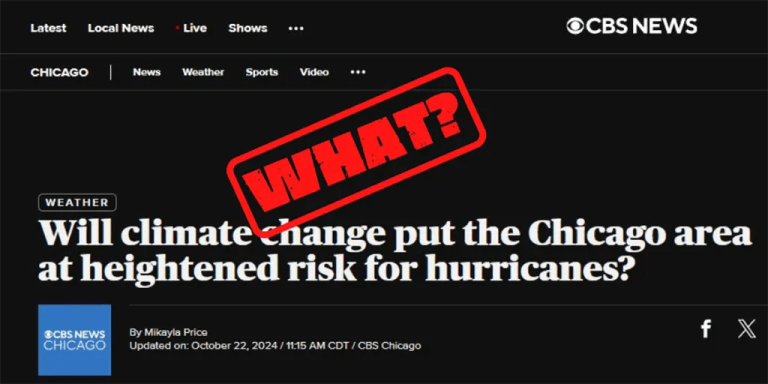from climaterealism
Author: Linny Luken
A recent CBS News article, “Chicago,” asked a question that no one is asking: “Will climate change put the Chicago area at greater risk from hurricanes?” The question and the thinking behind it are ridiculous. While it is true that the remnants of tropical storms and hurricanes can reach Chicago, and have done so in the past, there is no reason to think that climate change will make them more likely to occur in the future, or more severe if or when they occur.
CBS claimed that recent Hurricane Helene “brought tropical flooding to inland areas that are normally not at risk” and warned that it was now clear that “climate disasters can happen anywhere”. Aside from the obvious problem with CBS conflating climate (long-term averages) with weather (short-term events), it's not common for hurricanes to bring heavy rain inland, which is also untrue. In fact, hurricane-related flooding occurred in the Appalachians long before industrialization was blamed. The 1916 flood in Asheville, North Carolina, was much worse than recent floods.
If that wasn't silly enough, CBS veered into the unscientific territory of rapid attribution research, claiming that human contributions to climate change “are fueling the rapid intensification of Milton, according to Climate Central,” and asking questions like: “[a]If the impacts of climate change become faster, what, if anything, will reach Illinois from hurricanes now or in the future?
There is some truth to this question, which is that the remnants of tropical storms and hurricanes can and do affect areas far from the coast, with CBS giving examples of Hurricane Ike and Tropical Storm Lowell, which caused the 2008 flooding in Chicago Severe enough to warrant declaring a state of emergency.
CBS cited reports from Climate Central, a climate activist and advocacy group that has often been found to be spreading false news and misleading information about climate science to promote alarmist rhetoric. For example, they tout the University of Maine's 2023 climate reanalyzer as flawed, as if it represents measurements when in fact it does not. CBS also cited rapid attribution analysis from organizations like World Weather Attribution. climate realism Repeatedly masking their false “scientific” assertions, they use counterfactual computer models to claim that any given storm is the result of man-made climate change. World weather attributions will never have a weather event that cannot be linked to climate change because they first assume that climate change affects every weather event.
The reason mainstream media organizations like CBS rely on attribution research groups rather than real data is because the data available does no Shows hurricanes are becoming more intense, wetter or more frequent. Although climate realism With so many hurricanes covered this season ( here , here , and here , just in the past two weeks), it's worth revisiting the facts again.
According to global hurricane frequency data, major hurricanes are not becoming more common, nor are less powerful hurricanes. (see picture below)

In terms of intensity, there is no obvious increasing trend in global accumulated cyclone energy. If that's not enough, Table 12.12 in Chapter 12 of the Intergovernmental Panel on Climate Change's Sixth Assessment Report states that there is no link between tropical cyclones and climate change. Not now or in the future, even under extreme emissions scenarios. (see picture below)

Facts are inconvenient for climate hucksters like CBS, who end up looking like fools trying to ignore reality in order to scare readers in places like Chicago. Yes, the remnants of a hurricane or tropical storm can reach Chicago, but there is no indication that such events are common or will become a common problem in the future. CBS had to know this, otherwise they wouldn't be so reliant on vague claims from artists.
Relevant
